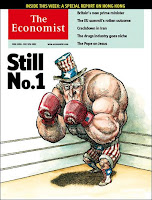Mirror mirrror on the wall, who is...

In the Hobbled Hegemon the guys at The Economist concluded that while its "troubles in Iraq have much weakened it," America is "likely to remain the dominant superpower." It's a long piece, but I didn't but the main thesis. Here for example it poses the argument that American is on decline in the Middle East:
Strategists wonder whether the Iraq war has damaged America so badly as to set it on a path to “imperial decline”. Is the post-Soviet “unipolar” world, established after America's first war against Saddam Hussein in 1991, coming prematurely to an end as a result of the second war to topple him? For Richard Haass, president of the Council on Foreign Relations, a leading think-tank, “the American era in the Middle East is over”—and because of the importance of the Middle East, American global power has also been weakened, for years if not for decades.And here:
For about two years after the invasion of Iraq, the Bush administration could still find evidence to claim that its muscular unilateral military action, however controversial, had made the world safer, encouraged democracy in the Middle East and enhanced American power. The Taliban were gone; al-Qaeda was on the run; America had new military bases in Central Asia; Saddam Hussein was captured and Iraqis voted freely. Moreover, Libya gave up its weapons of mass destruction; Palestinians elected the moderate Mahmoud Abbas after the death of Yasser Arafat; Israel left Gaza; and Syria withdrew from Lebanon. Peaceful revolutions in Ukraine and Georgia brought new pro-Western leaders.
But as the situation in Iraq has worsened, many of these gains have been reversed. Russia denounces America's “diktat and imperialism”, talks of a new arms race, threatens oil and gas supplies to neighbours regarded as unfriendly, and says it wants to overturn the Western-inspired economic order. America is being rolled back from parts of Central Asia, while Ukraine is in turmoil.
In the Middle East, a defiant Iran is stoking the insurgency in Iraq (and possibly also in Afghanistan). Its Lebanese proxy, Hizbullah, survived Israel's military onslaught last year with greater prestige. The Taliban have stepped up their insurgency. Above all, al-Qaeda has reconstituted itself, and exploits Muslim resentment over the “war on terror” to recruit new followers to its global jihad.
Mr Bush has changed his ways. Instead of threatening to topple rogue regimes, his administration has re-opened a diplomatic dialogue of sorts with North Korea, Syria and, most recently, Iran. America has rediscovered multilateralism, not least to keep a united front in imposing limited sanctions on Iran.
The “forward strategy of freedom” intended to democratise the Middle East has stalled, not least because elections have worsened sectarian tensions in Iraq and brought Hamas to power in the Palestinian territories. “Will America stay strong? Yes,” says one senior marine. “But can it use its power? That's a different question.”
The dilemma for America is whether withdrawing from Iraq will restore America's strength or signal greater weakness. America's top brass, for the most part, want more time to try to turn things around in Iraq and avoid another Vietnam. Insurgencies take many years to defeat, they say, pointing to the British experience in Malaya. They are right. But a more apt parallel may now be Palestine, where the British gave up holding the ring between Arab and Jew and left them to it.
Now... this is supposed to be the counter-argument, explaining why America is still Number 1:
Senior American officials console themselves with the thought that, whatever happens in Iraq, America will bounce back. Before long, perhaps after Mr Bush has left the White House, those complaining about America's overbearing power will come begging for its help.
America still spends roughly as much on defence as the rest of the world put together (see chart 2), and remains the only country able to project military power globally. Next year's budget request for $623 billion (“a gargantuan sum”, according to one Pentagon official) represents 4% of GDP, which is low by historical standards (see chart 4). Military commanders often say that “the nation is not at war; the military is at war”; that is, the American public is not yet making real sacrifices. Taxes remain low, while the casualties are moderate enough not to be greatly felt, particularly by the urban elite. America has ample reserves to defend its global role and, Mr Krepinevich argues, potential rivals also have weaknesses. European countries are rich, but for the most part they are unwilling to spend money on military power; Russia's production of oil and gas is declining, and its population is in a demographic death-spiral; China may yet undergo internal upheavals that could disrupt its economy.
And then there a few quotes from Robert Kagan who is "confident" that
the American-dominated “unipolar” world will endure. America has weathered worse disasters than Iraq, he says, not least soon after victory in the second world war, when the Soviet Union developed the hydrogen bomb and communists took power in China. Certainly America faces stronger regional antagonists, but none is yet competing for global supremacy, whether alone or in concert. If anything, many states want America's help to “balance” a rising China and a growling Russia. “A superpower can lose a war—in Vietnam or in Iraq—without ceasing to be a superpower,” says Mr Kagan, “so long as the American public continues to support American predominance, and so long as potential challengers inspire more fear than sympathy among their neighbours.”
Well... checkout the latest polls on Bush and Iraq and I don't see China inspiring so much fear. In fact, much of the "counter-balancing: taking place in the world today is aimed at the United States.
Comments
catholic cross | apartments rent Edmonton | flats to rent